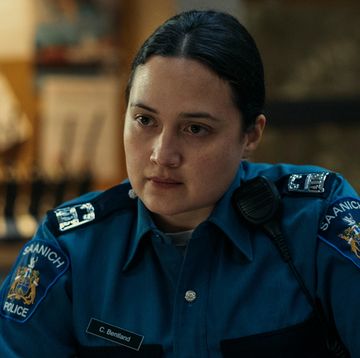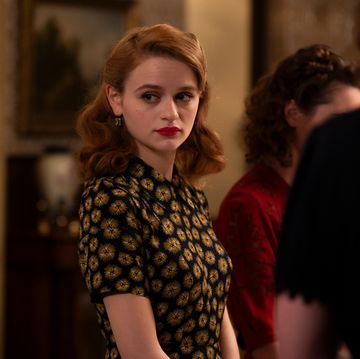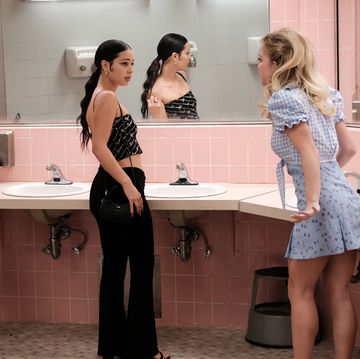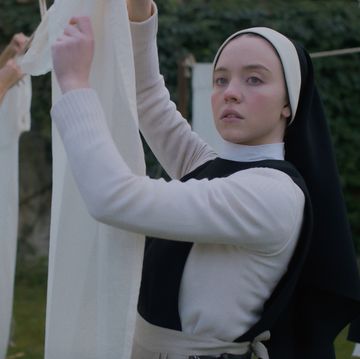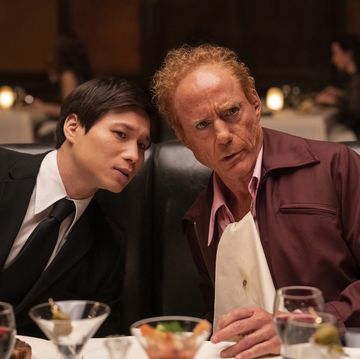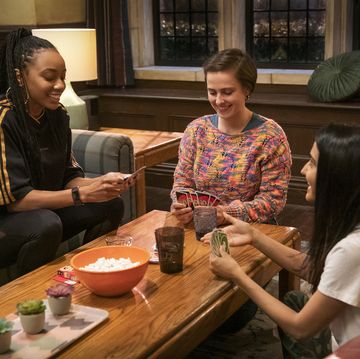This article appears in the March 2015 issue of ELLE magazine.
To write about the women of Mad Men in a way that sidesteps the usual fawning, rhapsodic, pin-up calendar approach is to confront a knot of fascinating contradictions. Mad Men, the high-toned Sunday night soap opera about the professional machinations and personal shenanigans of a group of '60s-era Madison Avenue advertising executives, has also dramatized, through its constellation of female characters, a decade of profound change for women. This was the 10-year period that gave rise to The Feminine Mystique, NOW, The Equal Pay Act, gender-discrimination legislation, and protests at the 1968 Miss America Pageant. To watch this historical tsunami play out on-screen, at a time when we are often all-too-smugly confident that most of this gender stuff has been solved already, is to feel at once superior and hypocritical, grateful for the significant shifts that have occurred yet surprised by how much sexism quietly endures. Mad Men, while never ham-handedly ideological, has served as a tacit reminder of this duality. And surely this is, at least in part, why it's been one of the most discussed, celebrated, and argued-about series in television history.
"It was very confusing for people to see real behavior from that period. People were super judgmental about it," says Matthew Weiner, the show's famously intense 49-year-old creator, who, in conversation, is indeed fast talking and penetrating as a laser beam, but also warm, witty, and prone to long, discursive flights of lofty intellectualism. On a bright fall afternoon in Los Angeles, the kind of day that guilt-trips you for being indoors, we have met at a dark, hushed steakhouse known for its private booths; it is a place that Don Draper, Mad Men's brilliant, womanizing protagonist, might have chosen for an assignation. Weiner is dressed like a finance guy on Casual Friday, in a plaid blazer and button-down shirt. On his right fourth finger sits a chunky gold and onyx ring—an unexpected dash of Mafioso flair. For the next three hours, he'll talk about the show, launching into extended monologues complete with improvised dialogue and demonstrative hand gestures. He laughs often, in short, staccato bursts. Incredibly, he remembers the names of all 92 episodes, and, it would seem, every bit of dialogue, verbatim.
Weiner arrives at the restaurant having just finished the sound mix for the second half of the show's seventh and final season, which will air this spring. "It's all done," he says in a conspiratorial near-whisper. I have the feeling he's not only telling me the show is a fait accompli, he's also trying to absorb this himself. In 1999, when Weiner wrote the Mad Men pilot, he was 35 and working on a show called Becker. The series first aired in July 2007. In the intervening years, he spent three seasons as a writer on The Sopranos. By the time the final episode of Mad Men airs, he will have aged more than his characters. Meanwhile, we, his viewers, will have spent seven real (and 10 fictional) years with them: parsing what they said, wondering why on earth they did what they did—one pleasure of the show is that nothing is overdetermined or overexplained—and discussing Mad Men's many literary themes and allusions, from John Cheever to F. Scott Fitzgerald to J.D. Salinger. The show's reach has been broad: It has won 15 Emmys and three Golden Globes, served as fodder for countless think pieces, and even inspired a line of clothing at Banana Republic and a set of Barbies by Mattel. As was true of its peers in the pantheon of television greats—The Sopranos, The Wire, Breaking Bad—Mad Men's denouement this spring will no doubt occasion a kind of collective mourning.
Before our meeting, I re-steeped myself in the series' first six and a half seasons, or 68 hours of Mad Men. In the preceding month, I have spent more time with Don, Betty, Peggy, Joan, Megan, Roger, et al. than I have with any actual person in my own life, and I am convinced that this man has created some of the most nuanced, realistic characters on television, male and female alike. It's the latter I'm most interested in, however. In Hollywood, complicated female characters are still rare mythological creatures: According to a 2012 study by the University of Southern California's Annenberg School for Communication and Journalism and the Geena Davis Institute on Gender in Media, only 38.9 percent of the speaking characters on prime-time programs are women. And these roles tend to be stereotypical or peripheral: girlfriends, sidekicks, relatives. "Sometimes, with women characters," says Weiner, "it's like, 'She's really pretty, and she's a mom.' "
Whether owing to his politics, his artistry, or the cadre of women writers and producers he works with—more than on almost any other show, by all accounts—Weiner's female characters are far from simple. There's Betty, the frustrated homemaker, who gave up a nascent modeling career for a husband and a house in the suburbs, and who often seems to be all id. There's Peggy—naive, young, but also a pure product of the meritocracy—whose smarts allow her to rise from secretary to copywriter to creative director. There's Joan, the sexually confident know-it-all office manager turned partner, who's always been the true power behind Sterling Cooper. And there's Megan, Don's twentysomething second wife, who doesn't think she should have to choose between a career and a family and is sweetly, sometimes annoyingly, idealistic about pursuing her acting dreams.
Mad Men tracks the rise of consumer culture, which was, at root, about the creation and manipulation of desire, mostly in women. The irony is thick: An industry dominated by men who don't have much use for women, other than as wives, mothers, or subordinates, depends on them as consumers. "Let me ask you something: What do women want?" Don queries while brainstorming a Rite-Guard Deodorant ad. ("Who cares!" Roger retorts.) Anytime the firm has to market products for women—lipstick, bras, tampons, pantyhose—Peggy becomes a focus group of one. "Women were always part of the copywriting process," explains Weiner, "'cause men always wanted to know the secret language: How are we going to sell to them?"
Early on, the show received its share of feminist criticism—and not surprisingly, because while Mad Men's female characters are at least equal players in hindsight, their fate wasn't always apparent. To rewatch the first season, and the pilot in particular, is to be shocked anew at the overt sexism. Peggy visits a (male) gynecologist's office, where she has been sent by Joan to get the Pill. As she sits there in her paper gown, he warns her not to become "some kind of strumpet" or "the town pump" to get her money's worth. Back in the office, Peggy has to contend with such an onslaught of unwanted male attention that she begins, in Weiner's words, "gaining weight as armor." The men now make objectifying remarks of a different but no less offensive stripe, calling her a "piece of fruit that went real bad, real fast." Christina Hendricks, who plays Joan, remembers that the actors were initially aghast at the antiquated behavior: "We'd get the scripts and all go, 'Oh, God! What?' at the table reads."
When I ask Weiner whether the show was a form of wish fulfillment for some viewers, his mood darkens. "That's a bummer," he says. "I didn't think sexism was going to be championed. I didn't think people were going to say, 'Hey, I'm going to slap my secretary on the ass.'" He's emphatic that his intention was to criticize the period by showing it in its unvarnished reality: "It's like, you do a movie about the Civil War, and there's slavery in it—I hope no one thinks that you're advocating slavery." Lisa Albert, a writer/producer who has been with Mad Men for all seven seasons, calls the show "stealth feminism of the best kind."
Yet to assess Mad Men purely in political or ideological terms is to miss its seductive human narrative. People with perfect principles display imperfect behavior all the time—this is the stuff of drama. Thus Peggy, as talented and ambitious as she is, casually undermines herself by sleeping with colleagues. And Don, while often reprehensible in his personal life, is generally fair-minded, even admirable, at work. "The animal nature of human beings as opposed to the civilized nature are two different things," Weiner says, "and we get to write about that."
A month later, I visit Weiner at his office in downtown Los Angeles. It is small and remarkable only for its Mad Men–esque furnishings: a midcentury modern desk and couch, vintage stereo system, shelves stacked with books, a full bar, and a plethora of mementos from the show. "I'm packing up this shit hole," he says, and laughs. "I can't live in a Mad Men museum." There is nothing about him that evokes the stereotypically rumpled writer; once again, he is smartly dressed, in a blue shirt, gray sweater, and dark jeans, with gray-and-orange socks winking from his black loafers. As we talk, he polishes off a cheese omelet smothered in tomato salsa, then relaxes with one arm draped across the back of the couch, as though basking in his success, which he admits he only recently could internalize.
Last spring, in a Paris Review interview, Weiner observed that "the driving question of the series is, Who are we?" As a Jewish man who has experienced anti-Semitism, he said, he can "sympathize with feminism the same way I identify with gay people and people of color, because I know what it's like to look over the side of the fence and then to climb over the fence and feel like you don't belong…."
Weiner, who was born in Baltimore in 1965, tells me that as a child he always felt like an outsider: "I was kind of the identified patient in the family. I was made to feel a little like Marilyn Munster." His parents were "aspirationally virtuous people," concerned with helping the disenfranchised. His father, Leslie, a neurologist and researcher, saw patients at the county hospital and public clinics in inner-city Baltimore; his mother, Judith, a stay-at-home mom, went to law school when Weiner was a boy and then worked at the Civil Rights Commission in Washington, D.C. Some of his earliest memories are of his parents taking him and his two older sisters and younger brother to political rallies.
In 1975, when Weiner was 10, the family moved to Los Angeles, where his father became the chairman of the department of neurology at the University of Southern California. (The Leslie P. Weiner Neurological Care and Research Center at USC is named for him.) Weiner attended Harvard School, now called Harvard-Westlake. He does not remember it fondly: "It was filled with a horrible frat mentality, racism, sexism, Reaganism. It is Sterling Cooper." His tells me that his time there solidified his abiding sense of himself as "a firm outsider."
"Our family can disagree about a lot of things, but everyone is quite united in our politics; it was just a very strong force in how we were raised," says Weiner's older sister, Allison Hope Weiner, who hosts The LipTV talk shows Media Mayhem and Crime Time. Equality and women's rights were paramount. "We all had ERA buttons. It was just part of our everyday life," Allison says. "My dad, too—he was the same way. He hired a lot of female residents in the neurology department at USC when other people weren't." Weiner's parents fostered an environment of equality and tolerance at home, too: "Matt would sit at the table and listen to my parents talk to my older sister and me in the exact same way they talked to him."
Weiner attended Wesleyan University, in part because no one else from his high school was headed there, majoring in an interdisciplinary great books program and trying and failing to get into writing classes. He credits Wesleyan with refining his notions of equality. "The first thing I heard in college was about the patriarchy, and I was like, 'Oh, I'd hate to be part of that. Oh wait, I am?'" He laughs. "I mean, I was in a class on twentieth-century poetry where we read Eliot and Pound and no other male writers." He tells me that he was surprised there was a conversation among viewers about whether Joan's fiancé had raped her. "I was kind of like, 'I guess they didn't go to Wesleyan.' It was not up for debate."
While we talk, Weiner's wife of 24 years, Linda Brettler, comes in to his office. A Harvard-educated architect who works on residential and commercial projects, Brettler has dark, chin-length curly hair and translucent skin. Like her husband, she's small in stature. She's wearing designer jeans, a camel-colored sweater, knee-high beige suede boots, and no makeup; she radiates the sort of instinctive cool that's impossible to imitate. Obviously delighted to see her, Weiner gets up off the couch and walks over to her. They exchange a quick kiss.
"It's insane, the amount of stuff in here!" Brettler says. She has come to help Weiner box it all up. "Oh, I totally forgot about her," she says, picking up an old-fashioned anatomical doll, a prop used when Pete Campbell and his wife, Trudy, visited a fertility doctor.
Weiner met and married Brettler, a Los Angeles native and the daughter of Holocaust survivors, while he was at USC film school, after graduating from Wesleyan. For the first five years of their marriage, she supported him while he stayed home to write. "We joke that I'm the guy in the relationship, and he's the woman in the house," she says. "'Cause he's always like, I never had to worry, you took care of me. And he's much more in touch with his feelings." During that time, Weiner made a $12,000 indie film called What Do You Do All Day?, about an unemployed guy who gambles his wife's money away. They have four boys, ages 10 to 18, and Brettler tells me that they've split the household duties from the beginning. "That's a very cool thing about our relationship," she says. "We never had any typical gender things. We were just two people who wanted to be with each other."
Brettler is also deeply involved with the show. She reads everything Weiner writes, with the objective of teasing out submerged themes, and has contributed numerous moments and lines. The empty elevator shaft in season five was Brettler's idea, as was the red dress lying rumpled on the hotel bed when Sylvia ends her affair with Don. "Oh my God, when I wanted to put her name on the credits, for free, they fought me," Weiner told me, referring to AMC executives. "If it was the other way around and there was a woman writing the show and she wanted to put her husband's name on it, they'd be like, 'He's really helpful, right?' "
More than once, I ask Weiner whether the process of writing female characters differs from writing male ones. He seems to view the question as irrelevant. "Not for me. Not for me," he says. "I think there is [a difference] for some people. It just comes down to—and it does not matter if you're a male or a female writer—how much you're willing to believe that women are secondary characters. How much effort are you going to spend on a secondary character? Are you going to sit down and tell their life story? Who gives a shit?" he says facetiously. "They are literally supposed to say, 'Oh my God, I can't believe that happened to you!' That's their big line."
One of his biggest struggles with AMC was over what he calls "the radical decision" to make Betty Draper a main character. It's almost impossible to envision Mad Men without the regular presence of the icy, flinty, angry, oppressed, childish, mesmerizing, polarizing figure of Betty—was ever a character so loved and reviled? The second episode of the first season revolves around her shaking hands, for which her doctor suggests she see a psychiatrist. At the end of the episode, in a disturbing instance of patriarchal solidarity, Don calls Betty's male therapist to get the lowdown on her. Weiner told me that when the network executives saw the episode, they were "extremely disturbed" that it focused on Betty. "I knew it was a good story. But you have to be interested in Betty. And they're like, 'Why do we care about this woman?' I'm like, 'You just met her. I'll make you care about her.' This whole story is about this man cheating on this wife. She's just going to be some good-looking woman? Aren't you wondering what's going on in her mind? And they were like, 'We are not interested in her.'"
In the end, it may be Weiner's fidelity to the truth, rather than to hackneyed television truths, that renders his characters so believable. In ordinary TV land, Betty would be frigid, and this would provide a rationale for her husband's philandering. Instead, she has carnal desires; she tells Don she thinks about sleeping with him all the time—and he still cads around on her. In TV land, where characters are always nice to each other, regardless of what has passed between them, Joan and Don would have remained friends—even after he lost the Jaguar account his colleagues essentially prostituted her out to win. Instead, she turns on him, voting first for his leave of absence and then for his ultimate dismissal. "I'm tired of him costing me money," she snaps. In TV land, Weiner says, with his toy-machine-gun laugh, "Peggy and Joan would have moved in together in episode two. And Peggy would've had a makeover by now."
When I ask Weiner whether he considers himself a feminist, he demurs. Never mind that he sits on the board of Planned Parenthood. Or that he is known for running an egalitarian workplace. ("I've been doing this for 30 years, and I've never worked in a writer's room that had more women," says Lisa Albert. "There was one season when, like, nine out of the 11 writers were women.") Although he tells me he is "gender blind in every aspect of his professional life," he hesitates to call himself a feminist; he's not sure whether, as he puts it, men "are allowed to have that word."
Interestingly, in spite of his progressive bona fides and the fact that the latter seasons of the show take place during the late '60s, a period when women were becoming active in the women's movement, the characters don't talk about or directly exhibit feminist ideals. They don't go to consciousness-raising meetings. They don't attend marches. Betty Draper reads Betty Friedan's The Feminine Mystique in one episode, and that's about it. By contrast, the show has addressed the era's other unfortunate ism, racism, far less ambiguously. We saw the characters react to Martin Luther King Jr.'s assassination: when, for example, Harry Crane complains about how the tragedy has affected his TV campaign, Pete calls him a racist. "Let me put it to you in terms you'll understand," he yells. "That man had a wife and four children." And when a rival agency drops water balloons on black protestors, the partners place a mock ad in the newspaper claiming the firm is an equal-opportunity employer. In response, a slew of candidates show up ("We cannot tell security," Pete says. "They are applicants") and the firm ends up hiring Dawn. Through her, we learn what it was like to be a young black woman in 1960s America.
"Matt had an interest in trying to represent, in his own truthful way, how people actually live in history," Mad Men writer-producer Semi Chellas tells me, "and you know, it's not like—we're not on this call discussing Ebola." Chellas explains that the plotlines arise from the characters, not historical events or political ideas. Betty is a wealthy suburban housewife who wouldn't necessarily have been exposed to radical activism, as she might have been in a city or on a campus. Peggy and Joan are working in a male-dominated, buttoned-up industry. "Obviously at that time there are people who are consciously, politically feminist, but these [characters] are at work," Chellas says. "It's advertising. Not feminism."
Albert tells me that stories involving consciousness-raising groups were pitched almost every season, but the writers could never find a way to make them feel organic. Peggy, who might have been the likeliest candidate for a feminist awakening, is a trailblazer, though not in a political sense. "She's not marching or burning her bra or trying to change the law," says Elisabeth Moss, who plays her. "She's actually down, on the field, in the office, dealing with the obstacles as they come…. She doesn't know about the glass ceiling. She sort of feels it when she bumps her head against it, and she just keeps going."
Still, there's one moment during our second interview that makes me wonder whether Weiner, whose mother was herself a vocal, politically active feminist, might not have more complicated feelings toward the movement—at least in its historical incarnation—than he realizes. Weiner has often said that Mad Men is told from a child's point of view, and that Sally Draper is the series' most identifiable character. At one point, he recounts for me a Sally Draper–esque memory of his own mother. When he was five or six, he walked into a "women's lib meeting" in a school basement and saw "all these women in a group, smoking, and...angry." It was for Weiner a moment of primal fear, like witnessing your father crying or catching your parents in the act. "I just felt like, Oh my God, my mother has been taken by aliens. She doesn't want to be with us anymore. She's going to leave us," he says, voicing a childhood fear I've heard other men of his generation express. "Feminism was, like, threatening." Children, of course, are fundamentally, constitutionally conservative: terrified of anything that disrupts the status quo.
And yet several of the writers I spoke to, while careful not to divulge any element of the next season—Weiner is maniacal about secrecy—intimated that some feminist plot point had not yet aired. It's fun to imagine which character Weiner might choose to radicalize. When we left them, Peggy had effectively become Don's boss, Joan was slyly and cannily carving out more territory for herself, Megan had lit out for the territory in California, claiming her independence and her career, while Betty was erupting in angry bursts: "I'm tired of everybody telling me to shut up!" I'd wager that The Feminine Mystique was a meaningful clue. "It was a strange stirring, a sense of dissatisfaction, a yearning that women suffered in the middle of the twentieth century in the United States," Friedan wrote in 1963. "Each suburban wife struggled with it alone." My money is on Betty.


